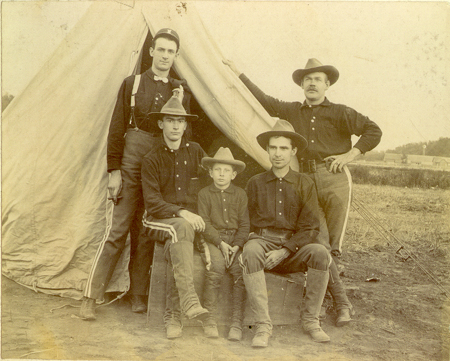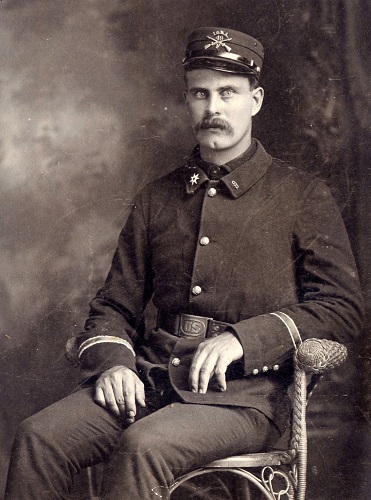

The following article appeared in Tama, Iowa newspaper, dated June 2, 1898, the day the 49th Iowa Volunteer Infantry left for service. Almost all of the men in the 49th Iowa had come from the northeast fourth of the state. The unit was mustered into service at Des Moines on June 2, 1898. For a while, it appeared as though the 49th was not going to be accepted into the federal service since Iowa's quota was only three regiments and the 49th had the junior colonel among the four regiments that were raised (the others being the 50th, 51st, and 52nd Iowa Volunteer Infantry regiments). However, according to the 49th's published history, the unit was so well trained and had such a good appearance that they accepted anyhow. At the time they were mustered into the federal service, the unit consisted of 50 officers and 780 men.
The 49th Iowa became part of the Third Brigade, Second Division of the Seventh Army Corps. The unit shipped out, bound for Jacksonville's Camp Cuba Libre on June 14, where it remained and was at that location when the fighting ended on August 13. The regiment was reorganized on October 13, and the 49th Iowa Volunteer Infantry was reassigned to the Second Brigade, Second Division of the Seventh Army Corps. The regiment finally departed Jacksonville on October 25, arriving at Savannah, Georgia the following day.
On December 10, 1898, the Spanish American War ended with the signing
of the Treaty of Paris.
Eventually the unit served in Cuba as part of the occupation forces, leaving Savannah, Georgia on December 19, 1898 aboard the U.S. Transport "MINNAWASKA" bound for Havana, Cuba and arriving three days later. The unit was stationed in Cuba for the winter, and departed Cuba in April of 1899. Companies A, C, F, H, I and K departed Havana aboard the transport SAN ANTONIO on April 5, arriving back at Savannah three days later. On April 18, after quarantine, these companies went into camp at Savannah. The headquarters and companies B, D, E, G, L and M departed Havana aboard the transport HAVANA on April 9, arriving at Savannah on April 11, and going into camp on April 16.
The 49th Iowa was mustered out of service on May 13, 1899 at Savannah. At the time of muster out, the unit consisted of 49 officers and 953 enlisted men. During its term of service, two officers and fifty-two enlisted men died of disease. One enlisted man died as a result of an accident, and two more deserted. Eleven men were discharged on disability.
Contributor Judy Landauer's grandfather, Arthur Leon Bruner, served in
the 49th Regiment Iowa Volunteers during this war. He played
cornet in the regimental band.
The Article:
"Last Saturday afternoon Tama was again the scene of enthusiastic
patriotic demonstrations. Early in the morning word was recieved
from Camp McKinley Des Moines, that the 49th Regiment Iowa Volunteers,
(the old first Reg.) had been ordered to Jacksonville, Florida, and that
the First batallion , consisting of Col. Dows and staff, Cos. K of
Toledo, H of Marshalltown, F of Tipton, and C of Cedar Rapids, would
pass through Tama over the Milwaukee about 3 o'clock in the
afternoon. Immediately after dinner an immense crowd began to
collect and when the special train finally arrived a crowd of at least
two thousand had congregated to bid them God Speed. Curiosity prompted
many, but the majority of those present were there to bid some dear
friend a fond and perhaps final farewell. The boys were enjoying
good health and were full of enthusiasm which was cheering to their many
friends. The train stopped but a short time, but during the time
short as it was the boys were all supplied with a cup of good hot coffee
and numerous other things. Co. K boys, the Bruner boys of the Regiment band and W. E. Rhodes and Chas.
Dunn of Co. F, Tipton of course recieved the greatest attention, but
every body shook hands with the boys and wished them good luck
regardless of acquaintance. So departs the last regiment of the
State Malitia. We believe they will give a first-class account of
themselves."

A fantastic
image of John (or perhaps Joseph) Shelton of Company F. Private
Shelton's
hat bears the insignia stating "IOWA / 49
/ F" indicating the regiment and company.
On his right lapel is a corps
badge pin, a white seven-pointed star, indicating the
2nd division of the 7th Corps to which
the 49th Iowa belonged. His other lapel bears three
links of chain indicating his membership
in the International Order of Odd Fellows. The broad
bands near his cuffs (believed to be
green with a yellow edge) likely indicate his service in the
medical service of the regiment.
Information courtesy of Judy Landauer (descendent of Arthur Bruner)
Clerk of Joint Committee on Printing, The Abridgement of Message from the President of the United States to the Two Houses of Congress. (Washington: Government Printing Office, 1899. Vol. 4, p 494.
Correspondence Relating to the War With Spain, Including the Insurrection in the Philippines and the China Relief Expedition. April 15, 1898 t July 30, 1902, Vol 1 (Washington DC: Center of Military History, 1993), 592.
Fiems, Photo of John Shelton.
Novak, Greg, Remember the Maine and to Hell with Spain; Being a Wargamer's Guide to the Spanish American War 1898. (Champagne: Ulster Imports, 1990). 36.
Statistical Exhibit of Strength of Volunteer Forces Called into Service During the War with Spain; with Losses from All Causes. (Washington: Government Printing Office, 1899).